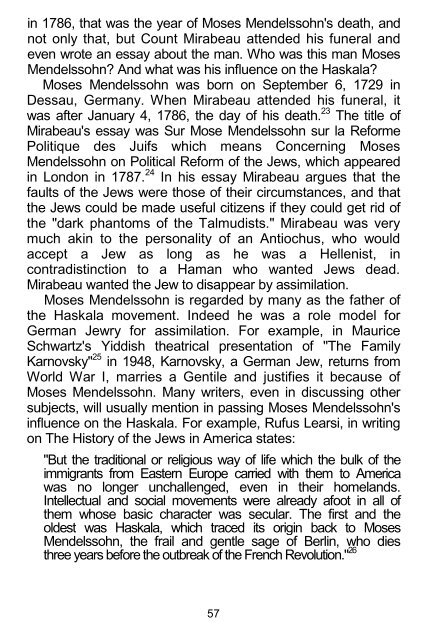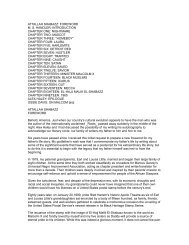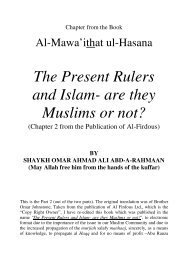You also want an ePaper? Increase the reach of your titles
YUMPU automatically turns print PDFs into web optimized ePapers that Google loves.
in 1786, that was <strong>the</strong> year of Moses Mendelssohn's death, and<br />
not only that, but Count Mirabeau attended his funeral and<br />
even wrote an essay about <strong>the</strong> man. Who was this man Moses<br />
Mendelssohn? And what was his influence on <strong>the</strong> Haskala?<br />
Moses Mendelssohn was born on September 6, 1729 in<br />
Dessau, Germany. When Mirabeau attended his funeral, it<br />
was after January 4, 1786, <strong>the</strong> day of his death. 23 The title of<br />
Mirabeau's essay was Sur Mose Mendelssohn sur la Reforme<br />
Politique des Juifs which means Concerning Moses<br />
Mendelssohn on Political Reform of <strong>the</strong> Jews, which appeared<br />
in London in 1787. 24 In his essay Mirabeau argues that <strong>the</strong><br />
faults of <strong>the</strong> Jews were those of <strong>the</strong>ir circumstances, and that<br />
<strong>the</strong> Jews could be made useful citizens if <strong>the</strong>y could get rid of<br />
<strong>the</strong> "dark phan<strong>to</strong>ms of <strong>the</strong> Talmudists." Mirabeau was very<br />
much akin <strong>to</strong> <strong>the</strong> personality of an Antiochus, who would<br />
accept a Jew as long as he was a Hellenist, in<br />
contradistinction <strong>to</strong> a Haman who wanted Jews dead.<br />
Mirabeau wanted <strong>the</strong> Jew <strong>to</strong> disappear by assimilation.<br />
Moses Mendelssohn is regarded by many as <strong>the</strong> fa<strong>the</strong>r of<br />
<strong>the</strong> Haskala movement. Indeed he was a role model for<br />
German Jewry for assimilation. For example, in Maurice<br />
Schwartz's Yiddish <strong>the</strong>atrical presentation of "The Family<br />
Karnovsky" 25 in 1948, Karnovsky, a German Jew, returns from<br />
World War I, marries a Gentile and justifies it because of<br />
Moses Mendelssohn. Many writers, even in discussing o<strong>the</strong>r<br />
subjects, will usually mention in passing Moses Mendelssohn's<br />
influence on <strong>the</strong> Haskala. For example, Rufus Learsi, in writing<br />
on The His<strong>to</strong>ry of <strong>the</strong> Jews in America states:<br />
"But <strong>the</strong> traditional or religious way of life which <strong>the</strong> bulk of <strong>the</strong><br />
immigrants from Eastern Europe carried with <strong>the</strong>m <strong>to</strong> America<br />
was no longer unchallenged, even in <strong>the</strong>ir homelands.<br />
Intellectual and social movements were already afoot in all of<br />
<strong>the</strong>m whose basic character was secular. The first and <strong>the</strong><br />
oldest was Haskala, which traced its origin back <strong>to</strong> Moses<br />
Mendelssohn, <strong>the</strong> frail and gentle sage of Berlin, who dies<br />
three years before <strong>the</strong> outbreak of <strong>the</strong> French Revolution." 26<br />
57




